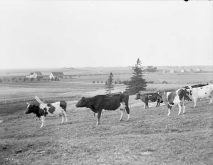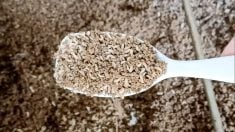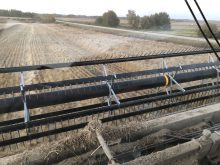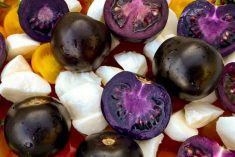A few weeks ago, award-winning soil fertility extension specialist John Heard said his goodbyes to colleagues as he moved into retirement.
His stalwart presence on the agriculture scene had a huge impact as I began my career with the Co-operator and entered the fray of agriculture writing.
When I started the job in May 2022, I had no idea what an extension specialist was. And there was likely no better person to introduce me to the topic.
Read Also

Spoken questions are what make it an interview
Recently, I was exchanging emails with the media email account at a government agency, hoping to reach a source for…
Starting in this position was a little overwhelming. I had plenty of experience as a journalist but limited experience writing about agriculture.
I first met Heard at last summer’s Crop Diagnostic School in Carman. He reminded me of one of the few teachers or professors in my life who left a mark. He was a magician who could turn dry facts and data into an exciting new adventure.
I remember the day fondly. It was a gorgeous prairie day without a cloud in the sky. Before the event was officially underway, a crowd had gathered around Heard as he discussed sulphur deficiency in corn.
It was immediately apparent that this guy loved his job. And that’s taking nothing away from the other excellent extension specialists who partake in the annual educational event. They all do amazing work, and I’ve learned as much from any of them as I have from Heard during my first year at the job.
But Heard has something special, and I doubt any of them would disagree.
As a soil fertility specialist, Heard has taken a lead role in helping Manitoba farmers implement the new federal climate policies, looking at ways to reduce nitrous oxide emissions. That was never going to be an easy task.
It’s not that farmers aren’t good environmental stewards; in fact, they have to be to maintain the complex ecologies on their farms. But it is easy to see how these new policies could be perceived as decrees coming from above, aimed at making their lives harder.
Heard has a knack for boiling it down to the bottom line for farmers and tying it to “proven science.”
Marla Riekman, a soil management specialist and Heard’s former colleague at Manitoba Agriculture, said that aspect of his delivery will stick with her.
“I can visualize him with his finger up in the air as he’s talking about ‘proven’ technologies, ‘proven’ science and ‘proven” knowledge’,” she said. “John understood the importance of scientific rigour — that proper statistical analysis — and was able to break it down into a practical form to make sure good information was getting down to the farmer.”
Details of the federal On-Farm Climate Action Fund had just become available the week of that diagnostic school, so much of Heard’s time was spent explaining some of the ways farmers could benefit.
“It’s a big winner,” Heard said about the funding available to farmers to implement variable-rate fertilizer applications that can reduce nitrous oxide. Heard brought in the “proven science” aspect by pointing to a study done by Ag Canada that found NO2 emissions could be decreased by 10 to 90 per cent by putting the right rate in the right place in the field.
“The incentive for doing this would be 50 per cent of the cost, up to $10,000,” said Heard. “So that’s one way to access the dollars and use them.”
Even farmers skeptical of the motivations behind federal climate policy can’t argue with a bottom-line argument.
Also apparent was Heard’s love of props as an educational tool. He had a display that demonstrated the different points in a farming system where nitrogen would be lost. A jug of water was at one end to represent fertilizer added to the soil, and the water flowed through pipes along the display. It dripped out slowly in some areas and poured more quickly in others, representing nitrogen loss. It was a simple design but extremely effective at getting the point across.
In the months after the school, Heard has been immensely helpful. Any time I found myself unable to get my head around something, I could count on him to help me understand. And ultimately, that’s what you want from an extension specialist.
It’s not just me who says it. His former colleagues agree.
“He’s been an excellent mentor for many people, not just myself,” said Riekman. “And he’s been an excellent colleague. He definitely deserves a lot of kudos.”
I feel lucky that the first year of my agriculture writing career coincided with Heard’s last year working in the field. I’ll definitely miss his presence, but I’m heartened knowing that he’ll likely be hanging around the sidelines, at least according to Riekman.
“It’s really hard to get rid of him,” she joked. “His retirement will be more of a voluntary role now. We might even see him pop in at the Crop Diagnostic School this year. Who knows?”
















